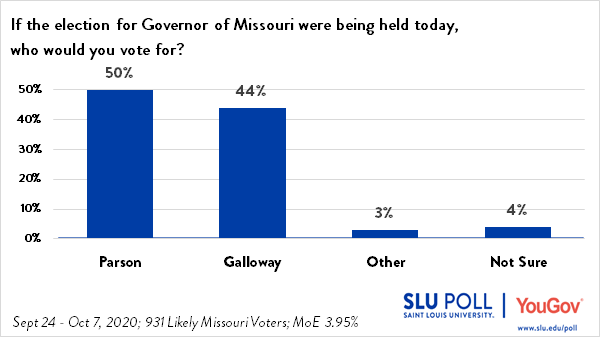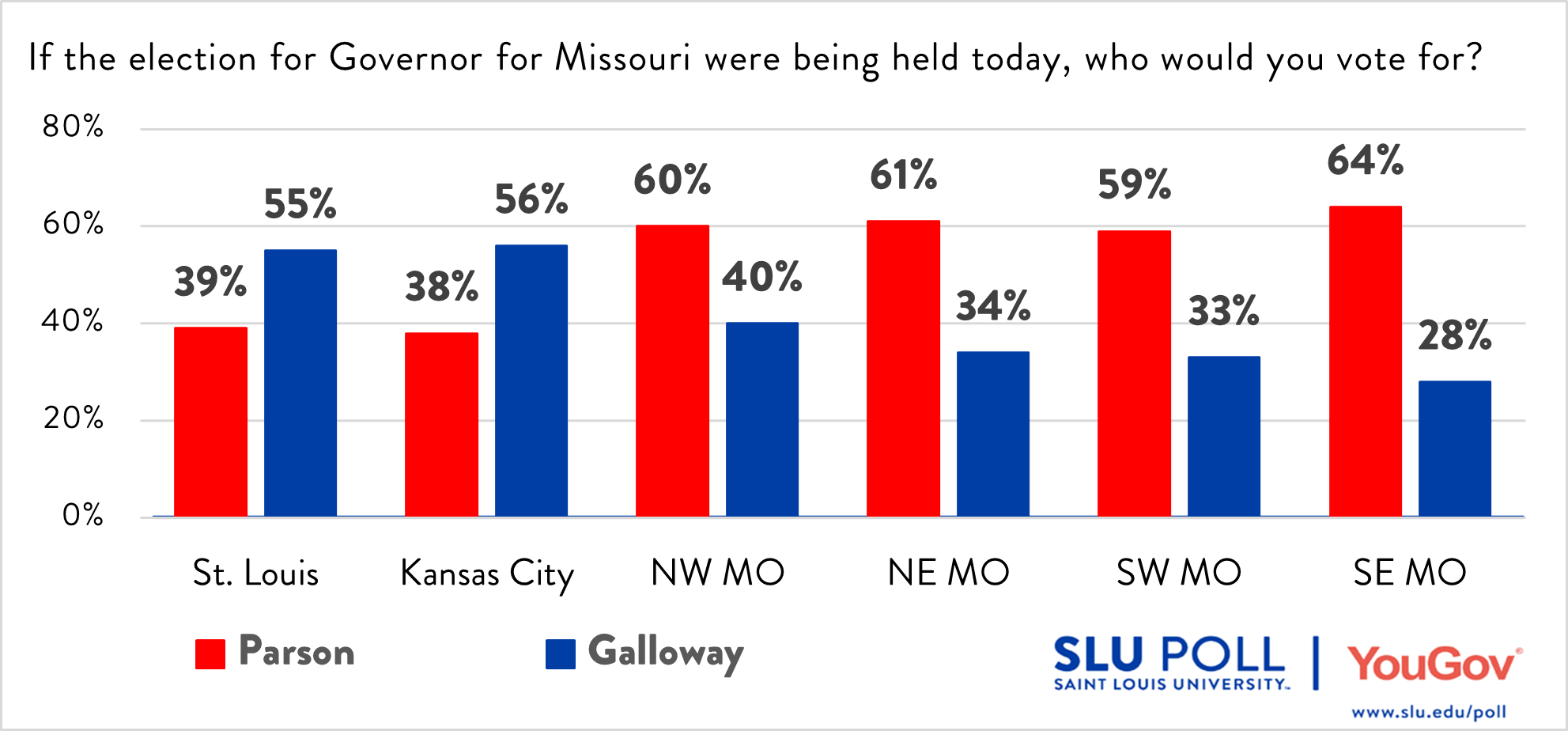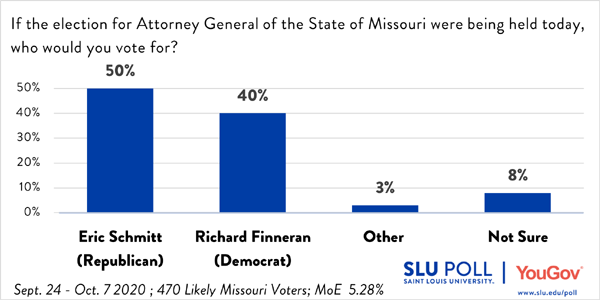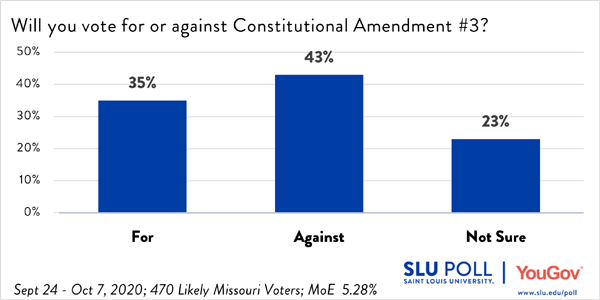Missouri Elections Analyses
By: Steven Rogers, Ph.D, Director, SLU/YouGov Poll
Parson Pulling Away From Galloway in Governor’s Race

The latest SLU/YouGov Poll shows Governor Parson pulling away from state auditor Nicole Galloway in the Missouri Governor’s contest. Mike Parson’s has 6-point lead on State Auditor Nicole Galloway, which is outside the poll’s 3.9% margin of error. Parson’s support largely comes from white, male, and rural voters who care most about about the economy and law and order. Galloway, meanwhile, has more support in St. Louis and Kansas City, particularly with voters who care about health care and COVID-19.
Support for Parson has increased by 8% since our SLU/YouGov June 2020 poll, and this increased support is largely attributable to “undecided” voters breaking for Parson’s by a 2:1 margin. With few undecided voters’ remaining, Galloway needs to convince existing Parson supporters to support her to avoid defeat in November.
What Happened to the “Statistical Dead Heat?”
In June, the SLU/YouGov poll found the Missouri Governor’s race to be in a “statistical dead heat.” 41% of likely voters supported Governor Parson, 39% supported State Auditor Galloway; and 17% of Missouri voters were undecided. So what happened to this dead heat? Governor Parson’s increased lead is not due to Galloway losing supporters but instead to undecided voters deciding to support the incumbent in recent months.
In October, we reinterviewed 530 of these undecided voters from June to see how their opinions changed. At least 93% of voters who said they supported Parson or Galloway in June supported the same candidates in October. However, 55% of voters who were “Not sure” in June supported the Governor in October. Only 27% of June “Not sure” voters support Galloway. Undecided voters from June largely settled on their own party’s candidates. 100% of previously undecided Democrats now support Galloway, and 95% of previously undecided Republicans now support Parson. Parson and Galloway split undecided independents 51% to 49%.
Who are Parson and Galloway Supporters?
Parson’s base is largely white, male voters. Parson’s lead among men is 55% to 40%, and this lead grows to 59% to 35% when only considering white men. Galloway holds a slight edge among women voters, 47% to 45%, and large lead among African Americans, 79% to 9%. These advantages, however, are not enough to close the gap between the two candidates.

Galloway’s regional support is greatest in the St. Louis and Kansas City regions, with approximately 55% of voters supporting Galloway in each of these areas, but only 50% of voters from urban areas across the state support the auditor. Outside of St. Louis and Kansas City, Galloway’s overall support in the state falls below 40%. Parson, meanwhile, holds a commanding lead among rural voters: 65% to 30% and a slight edge among suburban voters: 47% to 45%. For Galloway to be successful, she will either need extremely high turnout from St. Louis and Kansas City or convince more rural voters to support her.
What Issues Matter for Parson and Galloway Supporters?
Parson’s supporters most care about the economy and law and order, and Galloway supporters care about health care and COVID-19. 38% percent of Parson supporters stated that the economy was the most important issue to them in the Governor’s race. Over 60% of Parson voters additionally rated the Missouri economy as “Excellent” or “Good” but only 5% of Galloway supporters saw the economy as this strong. Attitudes of the economy largely correspond whether Missouri voters think the state is headed in a good direction. 73% of Parson supporters agree that “Missouri is on the right track and headed in a good direction. Only 5% of Galloway supporters agreed with this statement.
Only 10% of Galloway supporters stated the economy was the most important issue to them in the Governor’s race. Instead, almost two thirds of Galloway supporters indicated that health care (33.3%) or COVID-19 (33.2%) was the issue most important to them in the Governor’s race. By comparison, only 9.7% and 2.4% of Parson supporters said health care or COVID-19 was their most important issue in the Governor’s race.
COVID-19
The COVID-19 pandemic has become increasingly politicized, and the October SLU/YouGov poll identifies key differences between how Parson and Galloway supporters view and approach the pandemic. 88% of Galloway supporters, for instance, do not approve of the Governor’s handling of the COVID-19 pandemic, but 81% of Parson supporters approve of the Governor’s performance related to COVID-19.
These results resemble the mask wearing behavior of Parson and Galloway supporters. 92% of Galloway supporters stated they wear a mask “all the time” when in a store or business but only 57% percent of Parson supporters do.
Attorney General Race

Republican Incumbent Eric Schmitt leads Democratic challenger Richard Finnerman 50% to 40%. Schmitt's base of support looks very similar to Parson's, with his greatest support coming from regions outside of St. Louis and Kansas City along with rural, white voters. More voters are undecided in the Attorney's General race than in the Governor or Presidential contest, suggesting that Finnerman does not need to persuade as many voters away from Schmitt as Galloway needs to swing from Parson, but with a 10-point lead, Schmitt's reelection looks likely.
Constitutional Amendment 1
Most Missouri voters support Amendment 1, which would set term limits on state executive offices like the governor and attorney general, 51% to 29% (margin of error of 5.8%). Missouri already has term limits for state legislative offices. More Democrats, Republicans, and Independents support the amendment than oppose, and the amendment has healthy backing across the state. 20% of voters are “Not sure” where they stood on the Amendment, but it would be surprising if the Amendment did not pass.
Constitutional Amendment 3

There is more opposition to Constitutional Amendment 3, which has implications for 2020 redistricting. Amendment 3 would largely undo Constitutional Amendment 1 – sometimes known as the “Clean Missouri” Amendment, which passed in 2018 with 62% of the vote. Only 35% of Missouri voters support Amendment 3, 43% oppose it, and 23% are undecided (margin of error 5.3%). Democratic voters oppose the Amendment by a 2:1 margin, but more Republicans support than oppose the Amendment (43% to 34%).
In interest of disclosure, this Amendment 3 survey question mistakenly stated that lobbyist contributions would be limited to a maximum of $5 instead of $0. The SLU Poll team takes responsibility for and regrets this error.